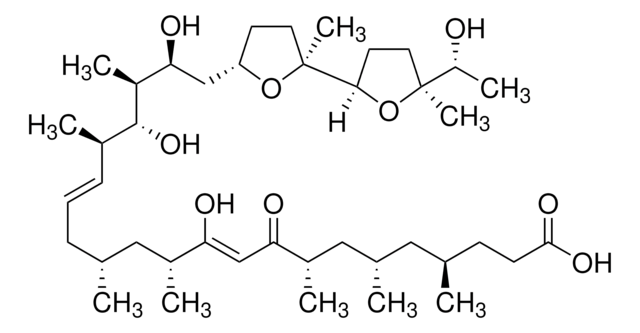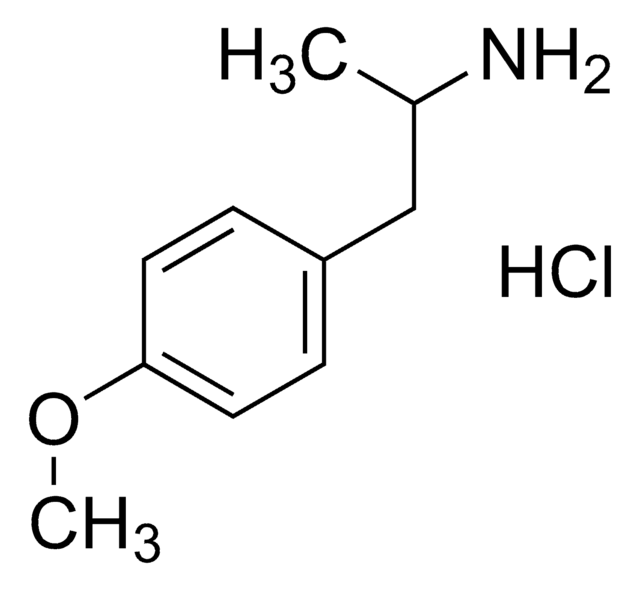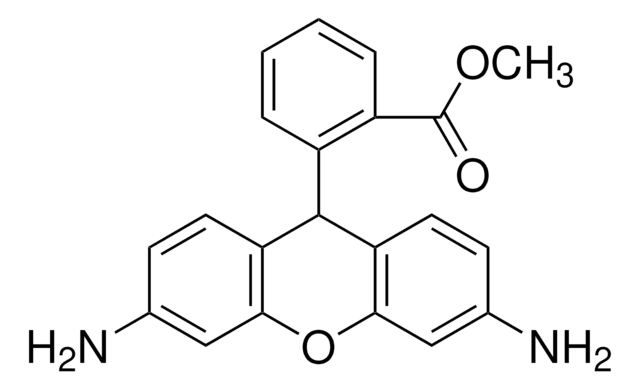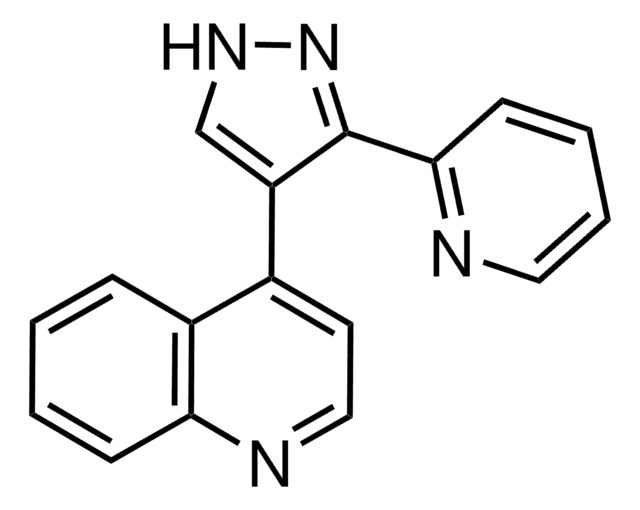5.00582
Phorbol-12-myristate-13-acetate
≥98% (HPLC), liquid, PKC activator, Calbiochem®
Synonym(s):
InSolution Phorbol-12-myristate-13-acetate, 12-O-Tetradecanoyl-phorbol-13-acetate, PMA, TPA
About This Item
Recommended Products
product name
Phorbol-12-myristate-13-acetate, InSolution, ≥98%, 10 mM in DMSO, extremely potent mouse skin tumor promoter
Quality Level
Assay
≥98% (HPLC)
form
liquid
manufacturer/tradename
Calbiochem®
storage condition
OK to freeze
avoid repeated freeze/thaw cycles
desiccated (hygroscopic)
protect from light
storage temp.
−70°C
InChI
1S/C36H56O8/c1-7-8-9-10-11-12-13-14-15-16-17-18-29(39)43-32-24(3)35(42)27(30-33(5,6)36(30,32)44-25(4)38)20-26(22-37)21-34(41)28(35)19-23(2)31(34)40/h19-20,24,27-28,30,32,37,41-42H,7-18,21-22H2,1-6H3/t24-,27+,28-,30-,32-,34-,35-,36-/m1/s1
InChI key
PHEDXBVPIONUQT-RGYGYFBISA-N
General description
Biochem/physiol Actions
PKC
Ca2+-ATPase
Packaging
Warning
Physical form
Reconstitution
Other Notes
Tepper, C.G., et al. 1995. Proc. Natl. Acad. Sci. USA92, 8443.
Oishi, K., and Yamaguchi, M. 1994. J. Cell. Biochem.55, 168.
Macfarlane, D.E., and O′Donnell, P.S. 1993. Leukemia7, 1846.
Ghandi, V.C. and Jones, D.J., 1992. Neuropharmacol.31, 1101.
Hortelano, S., et al. 1992. J. Biol. Chem.267, 24937.
Kontny, E., et al. 1992. Eur. J. Pharmacol.227, 333.
Zanaboni, P.B., et al. 1992. J. Appl. Physiol.73, 2011.
Saltis, J., et al. 1991. J. Biol. Chem.266, 261.
Beguinot, L., et al. 1985. Proc. Natl. Acad. Sci. USA82, 2774.
Perchellet, J. 1985. Carcinogenesis6, 567.
Nishizuka, Y. 1984. Science255, 1365.
Mastro, A. 1982. Lymphokines6, 263.
Legal Information
Signal Word
Danger
Hazard Statements
Precautionary Statements
Hazard Classifications
Acute Tox. 3 Dermal - Acute Tox. 3 Inhalation - Carc. 2 - Eye Irrit. 2 - Resp. Sens. 1 - Skin Irrit. 2 - Skin Sens. 1
Storage Class Code
6.1C - Combustible, acute toxic Cat.3 / toxic compounds or compounds which causing chronic effects
WGK
WGK 2
Flash Point(F)
188.6 °F - (Dimethylsulfoxide)
Flash Point(C)
87 °C - (Dimethylsulfoxide)
Certificates of Analysis (COA)
Search for Certificates of Analysis (COA) by entering the products Lot/Batch Number. Lot and Batch Numbers can be found on a product’s label following the words ‘Lot’ or ‘Batch’.
Already Own This Product?
Find documentation for the products that you have recently purchased in the Document Library.
Our team of scientists has experience in all areas of research including Life Science, Material Science, Chemical Synthesis, Chromatography, Analytical and many others.
Contact Technical Service







